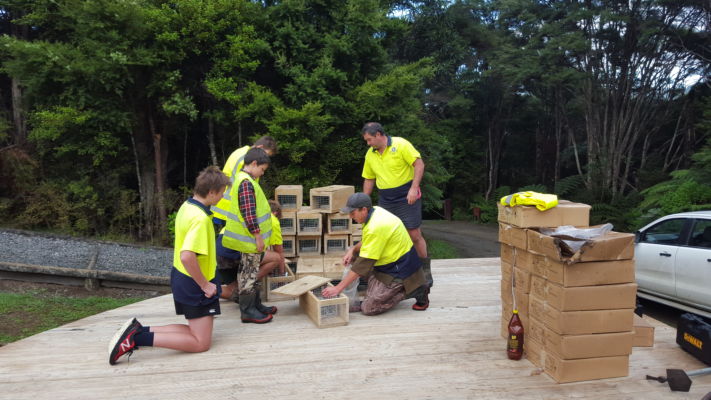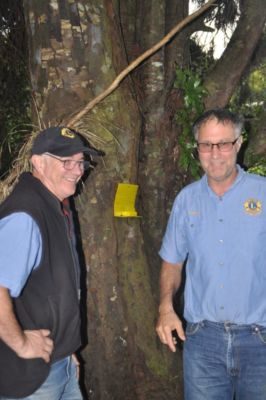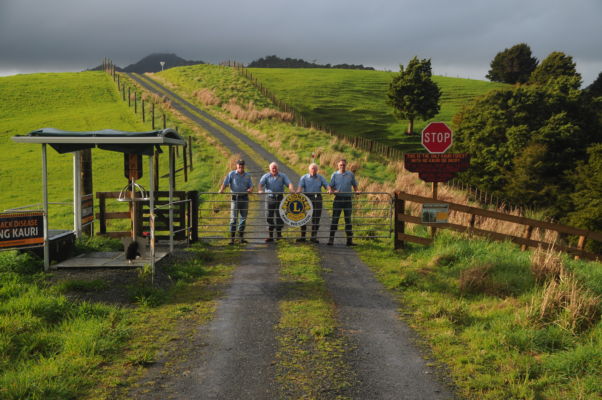Gerald Mannion has a story about the ‘moment of truth’ when he and fellow Tangihua Lions Lodge trustees realised just how much damage introduced predators had done to their forest. But first, a little background…
Thirty years ago, the Whangarei Mid Western Lions, a bunch of local farmers, decided that all young people should have the opportunity to learn to respect, enjoy and protect out native bush enviroment. There was – and is – some great forest in Northland. The problem 30 years ago was that there was nowhere that school classes and youth groups could stay while they studied and explored the region’s native bush.

Being farmers they simply got stuck in and built the Tangihua Lions Lodge on DOC land. In some cases they even mortgaged their own properties for funding for the project. Their vision and commitment has enabled generations of Northland children to explore Tangihua Forest, test their skills on the confidence course and learn about conservation. Over 15,000 students and others have stayed at the lodge over the last 30 years.
Gerald’s father and Bob Sheppard were amongst this group of conservation-minded farmers.
“Bob had a major role in building the lodge,” says Gerald. “He also laid out and sorted all the tracks.
Nowadays, Gerald is Chairman of the Board of Trustees that manages the outdoor education centre and Bob – 81 years old and still an active tramper and track cutter – is Board Secretary/Treasurer.
“In recent years compliance costs have sky-rocketed,” says Gerald, “And because a lot of low decile schools use the lodge, we were looking at ways to fundraise, to keep costs down.”
One idea for a fundraiser was to organise a run through the bush. Gerald, Bob and three other Trustees – all of them hunters – were up in the Tangihua Forest checking out the possibilities for some new tracks. Taking a break up on a ridge, someone mentioned (stirring a little perhaps), that it was “just as well we haven’t had any recent 1080 drops here or there wouldn’t be any birdsong…”
“Then we listened for the birds,” says Gerald, “and that was when we realised there wasn’t any birdsong. So we asked Bob what it had been like 30 years ago when he cut the tracks here…”
The men quickly realised that they had more than just compliance costs to worry about, if Tangihua Lions Lodge was to continue giving Northland children a rich outdoors experience.

“I always found being in the bush ‘nice and peaceful’,” says Gerald, “but until then, I hadn’t realised that it was more than just peaceful. It was silent. There are more birds in the average backyard than there are in the bush around the lodge at the moment.”
The trustees didn’t mess about. Gerald spent Christmas 2015 putting together a feasibility study and talking to both the Northland Regional Council and Department of Conservation.
“The feasibility study showed that we could do something,” says Gerald, “but it was going to take significant funding and a lot of work. Up until then we’d basically just hired out the lodge. Now there were three components to what we wanted to do: carry out conservation of the forest; develop educational resources around conservation – on subjects like myrtle rust, kauri dieback and trapping – and get the community involved.”
The Trust is keen for visiting schools and youth groups to make a hands-on contribution to the conservation work.
“We want to get the kids building traps and putting out markers. We want it to be sustainable, so that in another 30 years time, those kids who are visiting now will be the ones looking after Tangihua.”
Pupils from local schools have contacted the Trust and have come out to help cut tracks. According to Gerald, the Northland Regional Council has also been “fantastic” and local landowners are getting involved too.
“We have set up the Tangihua Community Pest Control Area. Six local farmers have signed up and are carrying out pest control over 1100 hectares of farmland,” says Gerald. “Within two days they’d caught a stoat, a ferret and several rats and now more farmers want to get involved.”
Ultimately the aim is to eradicate possums, cats, rats, ferrets, stoats and weasels from 10,000 hectares of farmland surrounding Tangihua Forest, as well as within Tangihua Forest itself.
Around 900 hectares of DOC land surrounds the lodge.
“We haven’t started pest control in the DOC land yet,” says Gerald, “but two young guys have been trained for their cyanide licence.”
The local polytechnic also offers training in possum recovery.
“Possums have been trapped for fur previously,” says Gerald, “But there’s been no other pest control for conservation.”
A World Wide Fund for Nature grant of $15,000 has just been awarded to the Trust and will be targeted at controlling all pests in a 400 hectare area around the lodge itself. The Trust will also have 40ha focussing on conservation of kauri snails, as well as other invertebrates and geckos. Their goal is to have 900ha of DOC land under pest management and 1500 children per year passing through the lodge’s new conservation programme.
“Conservation is a big hit with the parents too,” says Gerald. “We cover a lot of ground, including things like kauri dieback.”

Kauri dieback hasn’t been found at Tangihua and the Trust aims to keep it that way. Information on precautions to take before entering the forest is an important part of the teaching resource.
Gerald also spends a lot of time talking to community groups about the Trust’s aims.
“I go through the conservation programme with them, then two weeks later, when they’ve had time to think about it, I remind them about opportunities to volunteer.”
The benefits of volunteering go beyond conservation. There are social benefits for the rural community too.
“This is a real Lions project,” says Gerald in conclusion. “A group of people work together and then have a beer together afterwards. That’s important,” he emphasises. “A lot of people here are farmers. They normally work alone.”
Working together helps build a sense of community and break down isolation. Conservation and good conversation – made to go together…

